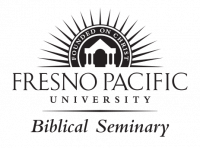There’s more to reconciliation than “doing something.”
Christena Cleveland, Ph.D., organized her first justice action the day Melissa, a sight-impaired girl, joined her first-grade class and was unable to join the kickball games that were the highlight of every recess. Cleveland ordered her schoolmates to line up against a wall until they figured out a game everyone could play. “I just took over recess,” she said.
With an upbeat humor—“You don’t learn this in seminary”—that slid seamlessly into passionate seriousness—“Reconciliation is a buzzword, but it’s the work of the cross”—the social psychologist, public theologian, author and professor showed a standing-room only audience of more than 200 community residents and Fresno Pacific University students, faculty and staff that action isn’t everything in Christian peacemaking.
“We completely gloss over the Holy Spirit,” Cleveland said in the first of her three talks September 24, 2018, for the Fresno Pacific University Believers Church Lecture Series “Bridging the Racial Divide.”
Her presentations were:
- “Spirituality & Racial Reconciliation,” a community forum from 10:00-11:00 a.m.
- “Pathways for a Healed and Healing Church: Reaching Across the Racial Divide,” a meeting with church leaders from 1:00-3:00 p.m.
- “The Church’s Mission: Faith, Justice and Reconciliation,” a missiology forum from 6:30-8:30 p.m.
All events were in Butler Church, 4884 E. Butler Ave., Fresno, adjacent to the main FPU campus. An associate professor of the practice of organizational studies at Duke University’s Divinity School and the author of Disunity in Christ: Uncovering the Hidden Forces that Keep us Apart, Cleveland has also been on the faculty at Wheaton College and Bethel College (Minnesota). The Believers Church Lecture Series explores the relevance of the Believers Church tradition in contemporary Christian life, and is supported by an endowment established by the late Dr. Herbert and Jessica Penner of Bakersfield, CA.
Though motivated by fairness, Cleveland’s elementary-school activism was not attached to her deep spiritual upbringing as a fifth-generation preacher’s kid on both sides of the family, a family that fasted on Sunday. “Two separate worlds. Two separate friend groups. Two separate everything,” she said.
Educated, affluent Christians—a group Cleveland, an African American woman, was quick to say included her—fall into the trap of simply wanting to stop injustice. “Sometimes we just shut down the pain,” she said. “We have degrees, we know lawyers.”
Though young Christena didn’t have her doctorate or lawyers on her contact list as a first grader, neither did she ask Melissa if being part of social change was what she wanted to do on her first day in a new school. “I wasn’t interested. I just felt the pain and I wanted to get rid of the pain,” she said.
The Holy Spirit—and true healing—is present in the pain. “The spirit didn’t come with a pat on the back or to give a massage,” she said. Instead, the spirit came to the disciples to get them out of the upper room and into a hurting world. “To empower them to do the work of reconciliation,” Cleveland said. “I will pour out my spirit on all humankind.”
See Cleveland's second session at https://vimeo.com/291994422 and her final session at https://vimeo.com/293155690

